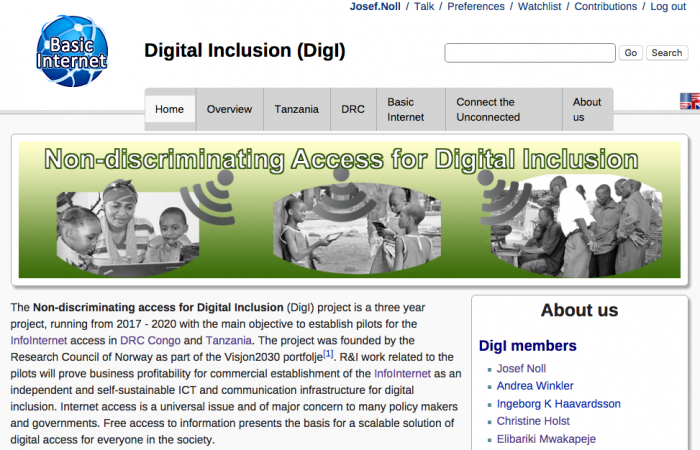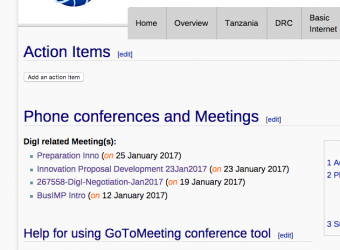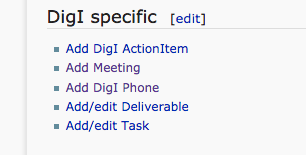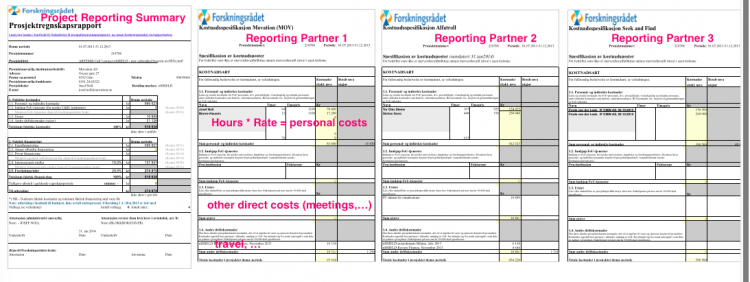Difference between revisions of "DigI:Working Together"
From its-wiki.no
Josef.Noll (Talk | contribs) (→⌘ Working Together) |
Josef.Noll (Talk | contribs) |
||
| Line 6: | Line 6: | ||
Q: How do we handle confidential and secure information | Q: How do we handle confidential and secure information | ||
:A: We have established [[DigAdmin:Home]] for confidential information | :A: We have established [[DigAdmin:Home]] for confidential information | ||
| + | |||
| + | Q: What kind of connectivity do we talk about in DigI? Mobile phone or "Internet" | ||
| + | :A: We address connectivity to information, thus Wifi (or mobile network) access to the [[InfoInternet]]. A major driver is ''affordability'', as we don't expect that people will pay for access to health and education information | ||
| + | |||
| + | Q: Who runs the operation on the ground in DRC? | ||
| + | :A: [[IPX extenso]] is our partner for ground operation in the selected villages in DRC | ||
| + | |||
| + | Q: Who runs the operation on the ground in Tanzania? | ||
| + | :A: We have [[NIMR]], [[SUA]], and the [[Ministry of Health in Tanzania]] as core partners in DigI, and [[Amotel]] as associated partner. Amotel has received funding from the government to connect 3 villages. See overview of partners on http://DigI.BasicInternet.no | ||
| + | |||
| + | Q: What is [[InfoInternet]], and why don't we call it Basic information? | ||
| + | :A: [[InfoInternet]] is the free access to (compressed) text and pictures, and the paid access to "high-bandwidth" services such as video. <br/> Facebook has established ''Internet.org'', having the service ''Free Basics''. Thus people have regarded BasicInternet.org as a supporting organisation of Facebook. That's why we called the service ''InfoInternet''. | ||
| + | |||
| + | Q: What about end-user devices? smartphones ? who wil provide them? how many? | ||
| + | :A: We need to look at the villages whom we connect in Tanzania and DRC, and what people in these villages use. If the people we would like to address use SmartPhones, then we can start the pilots with BYOD. | ||
| + | |||
| + | Q: Who are the end-users of the information? | ||
| + | :A: End-users are the people who don't see the value in digital information, or who can't afford access. ''My'' expectation is that we should concentrate on the younger (age < 40 years old) generation, as these ones need to find a job for living. | ||
| + | |||
| + | Q: Who is packaging the information, e.g. health information? | ||
| + | :A: Selection of information should be specified through [[DigI:WP-T1||WP-T1]] and [[DigI:WP-T3||WP-T3]], in collaboration with [[DigI:WP-I3||WP-I3]]. We need a prioritization for the selection of both access technology and services. | ||
| + | |||
| + | Q: Can you elaborate on the vision regarding content for DRC? "In DRC, the focus is on job opportunities" "Content for primary schools (DRC)" What do we mean by "Educational information"? What kind of literacy should be developed? Perhaps this can be more clarified during the first analysis phase? | ||
| + | :A: Agreed, should be specified during the first specification phase, [[DigI:WP-C1||WP-C1]], and might include links to energy, jobs, ..., or education. | ||
| + | |||
| + | Q: How do we differ from "One Laptop per child"? | ||
| + | :A: OLPC, http://one.laptop.org, has seen that laptop/tablet provision is of limited reach. After some 3-4 months the interest for the tablets go down, if they are not supported with free network access. | ||
Revision as of 23:46, 25 January 2017
| Digital Inclusion (DigI) | |||||||
|---|---|---|---|---|---|---|---|
|
This pages gives a short overview on how we work together in DigI. It contains an introduction to the wiki, a link to meetings, and other relevant information. If you have questions, please add it here:
Q: How can I edit the Wiki
- A: See DigI:How_to_edit
Q: How do we handle confidential and secure information
- A: We have established DigAdmin:Home for confidential information
Q: What kind of connectivity do we talk about in DigI? Mobile phone or "Internet"
- A: We address connectivity to information, thus Wifi (or mobile network) access to the InfoInternet. A major driver is affordability, as we don't expect that people will pay for access to health and education information
Q: Who runs the operation on the ground in DRC?
- A: IPX extenso is our partner for ground operation in the selected villages in DRC
Q: Who runs the operation on the ground in Tanzania?
- A: We have NIMR, SUA, and the Ministry of Health in Tanzania as core partners in DigI, and Amotel as associated partner. Amotel has received funding from the government to connect 3 villages. See overview of partners on http://DigI.BasicInternet.no
Q: What is InfoInternet, and why don't we call it Basic information?
- A: InfoInternet is the free access to (compressed) text and pictures, and the paid access to "high-bandwidth" services such as video.
Facebook has established Internet.org, having the service Free Basics. Thus people have regarded BasicInternet.org as a supporting organisation of Facebook. That's why we called the service InfoInternet.
Q: What about end-user devices? smartphones ? who wil provide them? how many?
- A: We need to look at the villages whom we connect in Tanzania and DRC, and what people in these villages use. If the people we would like to address use SmartPhones, then we can start the pilots with BYOD.
Q: Who are the end-users of the information?
- A: End-users are the people who don't see the value in digital information, or who can't afford access. My expectation is that we should concentrate on the younger (age < 40 years old) generation, as these ones need to find a job for living.
Q: Who is packaging the information, e.g. health information?
- A: Selection of information should be specified through |WP-T1 and |WP-T3, in collaboration with |WP-I3. We need a prioritization for the selection of both access technology and services.
Q: Can you elaborate on the vision regarding content for DRC? "In DRC, the focus is on job opportunities" "Content for primary schools (DRC)" What do we mean by "Educational information"? What kind of literacy should be developed? Perhaps this can be more clarified during the first analysis phase?
- A: Agreed, should be specified during the first specification phase, |WP-C1, and might include links to energy, jobs, ..., or education.
Q: How do we differ from "One Laptop per child"?
- A: OLPC, http://one.laptop.org, has seen that laptop/tablet provision is of limited reach. After some 3-4 months the interest for the tablets go down, if they are not supported with free network access.
- Title
- Working Together in DigI
- Author
- Josef Noll,
- Footer
- Working Together
- Subfooter
- to be presented
Contents
⌘ Working Together
- Collaborative project, building the knowledge community in IoT Security
- physical and virtual meetings
- virtual: DigI.BasicInternet.no wiki
- Meetings/Workshops
- PhD and PostDocs
- international exchange
⌘ DigI.BasicInternet.no Wiki
- DigI.BasicInternet.no is based on MediaWiki (as Wikipedia)
- knowledge base and publication platform
- with Semantic Extensions: machine readable
- consistent information
- How to use
- inform people by email, but put information on Wiki,
- 'DigI follows 'open world approach. Confidential information on http://DigAdmin.BasicInternet.no
- Structured information through Forms
- Tips on how to edit: DigI:How_to_edit
⌘ Notes and Limitations:
Note:
- all users can add new users Special:UserLogin/signup, however, access to DigI and DigAdmin has to be provided by an administrator
Limitations:
- File handling is not straight forward -
- File handling through https://owncloud.unik.no
- wiki language
⌘Meetings/Workshops
- Phone conference every second Wednesday of a month at (tbc)
- Physical Consortium meeting every six months (2 times/year) (tbc
- dates, see Meetings
⌘Reporting
- Reporting at the end of each quarter (Q1, Q2,...)
- Achievement-based
- minor focus on activities (summary)
- manpower estimation
- Using Wiki reporting scheme (to be developed)





